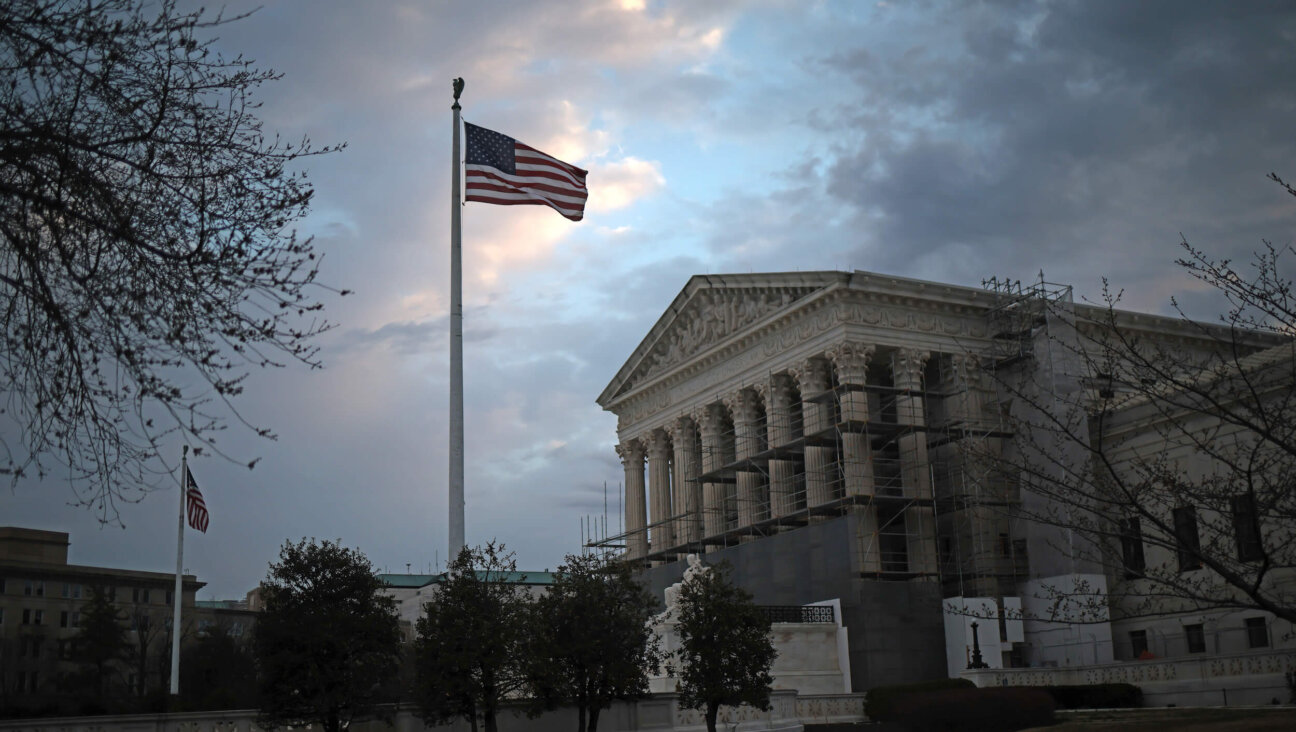Was It A ‘Mistake’ When Israel Banned Me, Bibi?

Israeli Prime Minister Benjamin Netanyahu is in damage control mode.
Yesterday, noted author, political commentator and Forward columnist Peter Beinart wrote about his experience being detained at Ben Gurion Airport by Israeli secret service and questioned about his views in a widely shared article.
Just hours later, Netanyahu himself released a statement in which he called Beinart’s arrest an “administrative mistake.” “Israel is an open society which welcomes all — critics and supporters alike. Israel is the only country in the Middle East where people voice their opinions freely and robustly,” Netanyahu wrote.
Really? Are my opinions of Israel now welcome? Should I book another flight to Israel after I was deported for my opinions earlier this summer?
On July 1, despite having a student visa and registration for a course at Hebrew University, I was denied entry to the country. I was held for seven hours, asked which Palestinians I know, why I spend time in Israel with people who are not Jews and what protests I have attended in the West Bank.
I was then refused entry.
The truth is, despite Netanyahu’s quasi-apology, Beinart’s airport ordeal — being questioned about what what “objectionable organizations” he affiliates with and what protests he has attended in the West Bank — is part of a series of events that have been taking place this summer at Israel’s entry and exit borders.
A few weeks after me, Jewish philanthropist Meyer Koplow found himself detained at Ben Gurion. Koplow was interrogated for having a pamphlet titled, “This Week in Palestine.” Koplow, a self identified Zionist, had obtained the pamphlet during his participation with Encounter, a program that brings Jewish-American community leaders to Israel/Palestine meet with Palestinians on the ground.
Then, in early August, the Shin Bet detained Simone Zimmerman and Abby Kirschbaum at the Israel-Egypt border as they were leaving for a vacation from their jobs with Israeli human rights organization Gisha.
The Jewish-American activists were held for over three hours. Among the first questions they were asked were: “Why did you come here to work with Palestinians? Why not with Jews?” They were also interrogated about what places they had visited in the West Bank and their opinion of Netanyahu.
Even Jewish citizens of Israel who criticize Israel’s occupation are experiencing the heavy arm of Israeli repression. The message that no criticism of Israeli occupation or association with Israeli or Palestinian activists will be tolerated was made crystal clear for Israeli author Moriel Rothman-Zecher on July 30, when he was taken aside at Ben Gurion for a “cautionary conversation” about his affiliations with peace groups and participation in nonviolent protests in Hebron.
A few months earlier, detention at the airport was used as a scare tactic against Israeli activist Tanya Rubenstein of the organization Coalition of Women for Peace.
And it’s not just at the border that dissent is being stifled. Last month saw the passage of Israel’s new Breaking the Silence law. Targeting Israeli veterans’ organization Breaking the Silence and Israeli human rights organization B’tselem, the law prohibits Israeli groups critical of the military from lecturing inside Israeli schools.
Apparently the “open society” Netanyahu spoke about while backtracking on Beinart’s detention does not extend to the young men and women who are moments away from conscription.
Of course, the recent harassment of diaspora and Israeli Jews pales in comparison to the countless numbers of Palestinians, whether residents of the occupied territories, Israeli citizens or living in diaspora, who have spent decades being detained and denied entry by Israel. For them, such policies are nothing new and Netanyahu has never taken action to guarantee their right to “voice their opinions freely and robustly.”
On the contrary. Last weekend, in response to a Tel Aviv protest of the Nation State Law by thousands of Palestinian citizens of Israel, Netanyahu cited Palestinian flags as evidence of the necessity for the law.
Never mind freedom to express opinion; for Palestinians, even basic identity, national self-determination and the Arabic language are not welcome.
I would love to believe Netanyahu’s explanation that Beinart’s detention was a mistake, that Israel is such a free-speech loving democracy (at least for Jews only) that if Beinart attends nonviolent protests in the West Bank, he will still be allowed entry.
I would love to believe that my denial of entry was also a mistake and I should again try to enter Israel, where I might voice my opinions “freely and robustly.”
Unfortunately, I know better. Israel has never hidden that it is not an open society for all. Certainly it is not an open society for those who live under occupation without basic human rights.
What is now being revealed is that it is not even an open society for Jews. No trite statement from Netanyahu can hide that.
Ariel Gold is the national co-director of CODEPINK. She manages the organization’s campaigns for Palestinian rights.
The Forward is free to read, but it isn’t free to produce

I hope you appreciated this article. Before you go, I’d like to ask you to please support the Forward.
At a time when other newsrooms are closing or cutting back, the Forward has removed its paywall and invested additional resources to report on the ground from Israel and around the U.S. on the impact of the war, rising antisemitism and polarized discourse.
Readers like you make it all possible. We’ve started our Passover Fundraising Drive, and we need 1,800 readers like you to step up to support the Forward by April 21. Members of the Forward board are even matching the first 1,000 gifts, up to $70,000.
This is a great time to support independent Jewish journalism, because every dollar goes twice as far.
— Rachel Fishman Feddersen, Publisher and CEO
2X match on all Passover gifts!
Most Popular
- 1

Film & TV What Gal Gadot has said about the Israeli-Palestinian conflict
- 2

News A Jewish Republican and Muslim Democrat are suddenly in a tight race for a special seat in Congress
- 3

Fast Forward The NCAA men’s Final Four has 3 Jewish coaches
- 4

Culture How two Jewish names — Kohen and Mira — are dividing red and blue states
In Case You Missed It
-

Fast Forward Britain’s Tate to return Nazi-looted painting to heirs of Jewish art collector
-

Fast Forward 3 sentenced to death for murder of UAE Chabad rabbi
-

Books The White House Seder started in a Pennsylvania basement. Its legacy lives on.
-

Fast Forward The NCAA men’s Final Four has 3 Jewish coaches
-
Shop the Forward Store
100% of profits support our journalism
Republish This Story
Please read before republishing
We’re happy to make this story available to republish for free, unless it originated with JTA, Haaretz or another publication (as indicated on the article) and as long as you follow our guidelines.
You must comply with the following:
- Credit the Forward
- Retain our pixel
- Preserve our canonical link in Google search
- Add a noindex tag in Google search
See our full guidelines for more information, and this guide for detail about canonical URLs.
To republish, copy the HTML by clicking on the yellow button to the right; it includes our tracking pixel, all paragraph styles and hyperlinks, the author byline and credit to the Forward. It does not include images; to avoid copyright violations, you must add them manually, following our guidelines. Please email us at [email protected], subject line “republish,” with any questions or to let us know what stories you’re picking up.
















